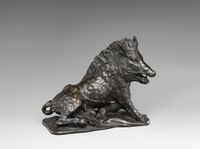
Vase (vase hollandois nouveau ovale) (one of a pair) (part of a set)
Sèvres Manufactory
An item at Metropolitan Museum of Art
This model of vase is made in two parts. The flared upper section would have contained earth for growing plants; the lower section held water. Small holes in the base of the upper section allowed the water to be absorbed. These two vases formed a garniture with the slightly earlier vase, "vase Boileau" (50.211.158a, b), and were owned by Prince Henry of Prussia.
European Sculpture and Decorative Arts
An exhibit at Metropolitan Museum of Art
The fifty thousand objects in the Museum's comprehensive and historically important collection of European sculpture and decorative arts reflect the development of a number of art forms in Western European countries from the early fifteenth through the early twentieth century. The holdings include sculpture in many sizes and media, woodwork and furniture, ceramics and glass, metalwork and jewelry, horological and mathematical instruments, and tapestries and textiles. Ceramics made in Asia for export to European markets and sculpture and decorative arts produced in Latin America during this period are also included among these works.




